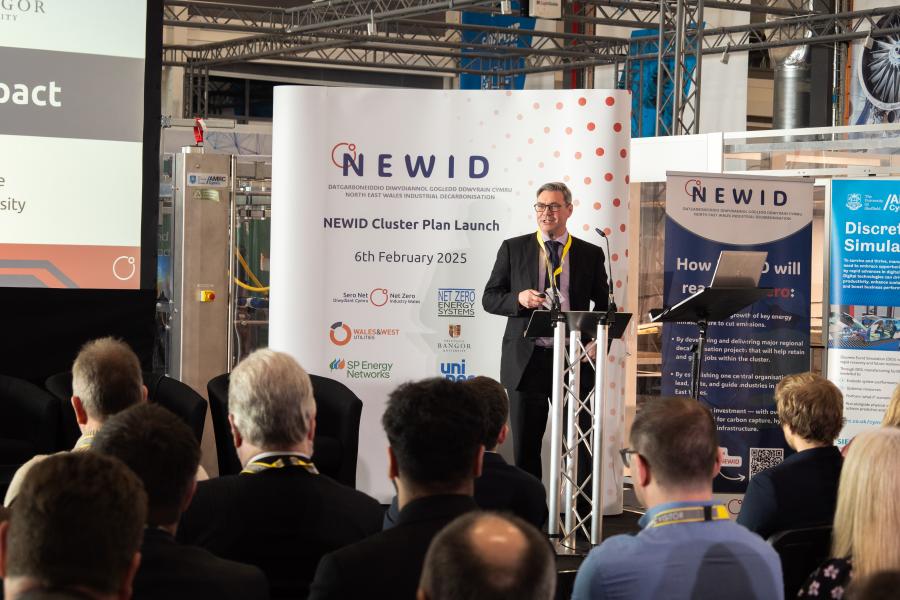North East Wales Industrial Decarbonisation Cluster (NEWID) - cluster plan launch
Professor Michael Butler from Bangor Business School and Dr Jack Callaghan from the School of Computer Science and Engineering have contributed to a high-profile industry led project demonstrating that North East Wales can lead the way in decarbonising industry — for the benefit of businesses and communities across the region.
The North East Wales Industrial Decarbonisation Cluster (NEWID) unveiled its brand new cluster plan at a launch event at AMRC Cymru on Thursday, 6 February, kickstarting a strategy for industrial decarbonisation across North East Wales, in 2025 and beyond.
The plan outlines that decarbonisation of the cluster by 2040 is possible, with Carbon Capture Storage (CCS) and hydrogen as the main drivers alongside infrastructure development and deployment in the 2020s and early 2030s.
NEWID is reliant on collaboration with projects in the North West of England with ongoing coordination required both inside and outside the cluster.
Significant public and private investment and support is required too, with more than £5 billion of CAPEX investment needed across decarbonisation technologies.
NEWID project partners - Uniper, Bangor University, Wales & West Utilities, SP Energy Networks, and Net Zero Energy Systems - have worked for over a year to develop the plan, which was made possible by grant funding from Innovate UK.
The launch event at AMRC Cymru saw the partners, alongside project sponsor, Net Zero Industry Wales (NZIW), reveal the plans to a packed audience — outlining how the region can meet Wales’ net zero goals by 2050.
The report states that decarbonisation of the cluster is technically possible by 2040 - with CCS and hydrogen as the main drivers of emissions reductions in the region.
However, the required infrastructure development and deployment in the 2020s and early 2030s is critical to achieving these goals - with NEWID also reliant on the delivery of complimentary strategies by local businesses and wider collaboration with projects in the North West of England.
Significant public and private investment is also required (over £5 billion of CAPEX investment) across decarbonisation technologies including CCUS, hydrogen, and electrical transmission connections.

In line with this, the plan makes clear the need for support and investment from both UK and Welsh Government. At the event, Ken Skates MS, Cabinet Secretary for Transport and North Wales echoed this depicting Welsh Government as a key partner in helping industry in the region to decarbonise. Reflecting on the day’s events, he said: “I am very pleased to see the results of this report, which represents the culmination of many months of effort and research by the NEWID project partners. Backed by Net Zero Industry Wales, which the Welsh Government established to support the decarbonisation of industry across the nation, I am confident that this plan will serve as a blueprint for the clean energy transition in North East Wales.
“As part of our commitment to decarbonisation and the transition to net zero, we must ensure that there is benefit in terms of securing and creating high-quality jobs and delivering prosperity for local communities. The NEWID Cluster Plan will enable this to happen and help the region on its journey to net zero. I am only too happy to lend it my support.”
The plan’s delivery will be empowered by NZIW — an independent body which supports Welsh industry on the delivery of net zero. To date, NZIW has put collaborative partnerships front and centre - supporting NEWID and leading the project to develop its industrial decarbonisation plan for North East Wales as well as providing advisory services on the launch event.
Ben Burggraaf, CEO of Net Zero Industry Wales, said: “It’s genuinely exciting to see the plans of the NEWID team. Their report shows that the mixture of CCS and hydrogen deployment and greater grid capacity, alongside other efficiency measures, can only be achieved through collaboration across industry, manufacturing, and the public sector.
“With the right support, I really do believe that North East Wales can become one of the UK’s leading clean energy transition hubs. NEWID’s report should be the framework to make it happen. The report builds on Net Zero Industry Wales’ ‘Team Wales’ approach, and I am delighted to support its findings and offer support to businesses and partners across North East Wales to take this forward.”
Professor Paul Spencer, Pro-Vice-chancellor (Research) at Bangor University, added: “North East Wales has a unique industrial footprint and being a partner on the NEWID project has put us at the heart of the region's efforts to transition to a sustainable future. Working with our industry project partners, the University has contributed expertise from two leading research centres Rhanbarth (Bangor Business Schools' Centre for Sustainable Regions and Economies) and BioComposites (Social Life Cycle Assessment team) to undertake a social and economic benefits analysis.
“This analysis identified key implementation challenges around jobs, skills and community involvement as well as innovative business models to tackle these. Colleagues in our School of Computer Science and Engineering have also led on the knowledge dissemination efforts which culminate in the Cluster Plan launch.”
Professor Michael Butler, from Bangor Business School commented “NEWID’s purpose is to support the decarbonisation of industry within North East Wales through its comprehensive plan which needs the backing of businesses, government, and investors to become a reality. We hope that the launch event will serve as a springboard for further collaboration and cooperation across North East Wales to decarbonisation the region and hit net zero by 2050.”




